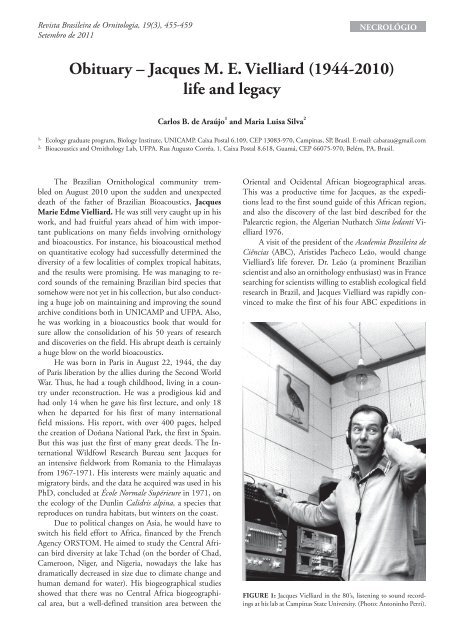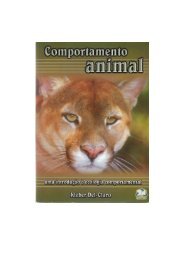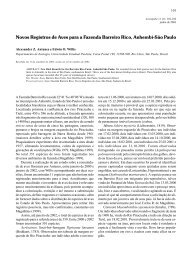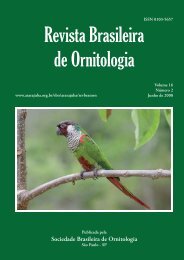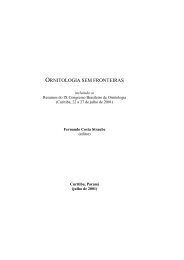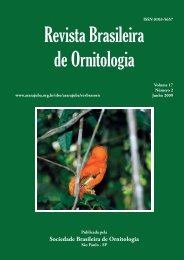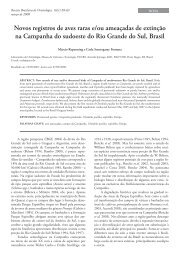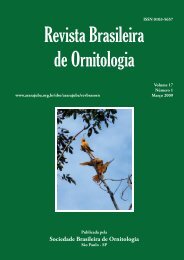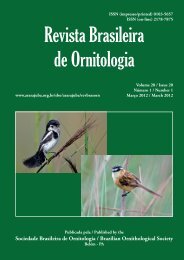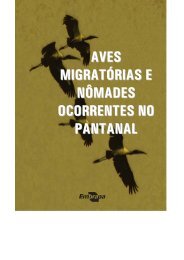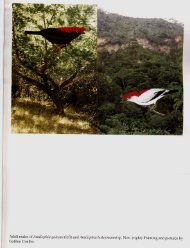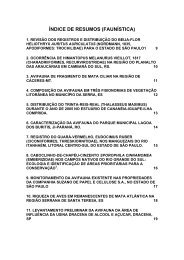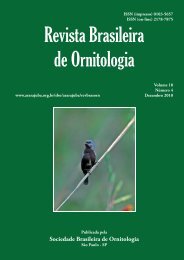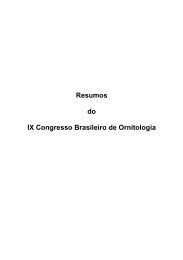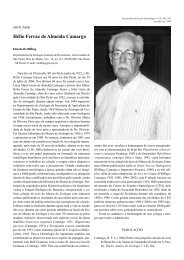art01 - laranjeiras.indd - Sociedade Brasileira de Ornitologia
art01 - laranjeiras.indd - Sociedade Brasileira de Ornitologia
art01 - laranjeiras.indd - Sociedade Brasileira de Ornitologia
- No tags were found...
Create successful ePaper yourself
Turn your PDF publications into a flip-book with our unique Google optimized e-Paper software.
Revista <strong>Brasileira</strong> <strong>de</strong> <strong>Ornitologia</strong>, 19(3), 455‐459Setembro <strong>de</strong> 2011NECROLÓGIOObituary – Jacques M. E. Vielliard (1944‐2010)life and legacyCarlos B. <strong>de</strong> Araújo 1 and Maria Luisa Silva 21. Ecology graduate program, Biology Institute, UNICAMP. Caixa Postal 6.109, CEP 13083‐970, Campinas, SP, Brasil. E‐mail: cabarau@gmail.com2. Bioacoustics and Ornithology Lab, UFPA. Rua Augusto Corrêa, 1, Caixa Postal 8.618, Guamá, CEP 66075‐970, Belém, PA, Brasil.The Brazilian Ornithological community trembledon August 2010 upon the sud<strong>de</strong>n and unexpected<strong>de</strong>ath of the father of Brazilian Bioacoustics, JacquesMarie Edme Vielliard. He was still very caught up in hiswork, and had fruitful years ahead of him with importantpublications on many fields involving ornithologyand bioacoustics. For instance, his bioacoustical methodon quantitative ecology had successfully <strong>de</strong>termined thediversity of a few localities of complex tropical habitats,and the results were promising. He was managing to recordsounds of the remaining Brazilian bird species thatsomehow were not yet in his collection, but also conductinga huge job on maintaining and improving the soundarchive conditions both in UNICAMP and UFPA. Also,he was working in a bioacoustics book that would forsure allow the consolidation of his 50 years of researchand discoveries on the field. His abrupt <strong>de</strong>ath is certainlya huge blow on the world bioacoustics.He was born in Paris in August 22, 1944, the dayof Paris liberation by the allies during the Second WorldWar. Thus, he had a tough childhood, living in a countryun<strong>de</strong>r reconstruction. He was a prodigious kid andhad only 14 when he gave his first lecture, and only 18when he <strong>de</strong>parted for his first of many internationalfield missions. His report, with over 400 pages, helpedthe creation of Doñana National Park, the first in Spain.But this was just the first of many great <strong>de</strong>eds. The InternationalWildfowl Research Bureau sent Jacques foran intensive fieldwork from Romania to the Himalayasfrom 1967‐1971. His interests were mainly aquatic andmigratory birds, and the data he acquired was used in hisPhD, conclu<strong>de</strong>d at École Normale Supérieure in 1971, onthe ecology of the Dunlin Calidris alpina, a species thatreproduces on tundra habitats, but winters on the coast.Due to political changes on Asia, he would have toswitch his field effort to Africa, financed by the FrenchAgency ORSTOM. He aimed to study the Central Africanbird diversity at lake Tchad (on the bor<strong>de</strong>r of Chad,Cameroon, Niger, and Nigeria, nowadays the lake hasdramatically <strong>de</strong>creased in size due to climate change andhuman <strong>de</strong>mand for water). His biogeographical studiesshowed that there was no Central Africa biogeographicalarea, but a well-<strong>de</strong>fined transition area between theOriental and Oci<strong>de</strong>ntal African biogeographical areas.This was a productive time for Jacques, as the expeditionslead to the first sound gui<strong>de</strong> of this African region,and also the discovery of the last bird <strong>de</strong>scribed for thePalearctic region, the Algerian Nuthatch Sitta ledanti Vielliard1976.A visit of the presi<strong>de</strong>nt of the Aca<strong>de</strong>mia <strong>Brasileira</strong> <strong>de</strong>Ciências (ABC), Aristi<strong>de</strong>s Pacheco Leão, would changeVielliard’s life forever. Dr. Leão (a prominent Brazilianscientist and also an ornithology enthusiast) was in Francesearching for scientists willing to establish ecological fieldresearch in Brazil, and Jacques Vielliard was rapidly convincedto make the first of his four ABC expeditions inFigure 1: Jacques Vielliard in the 80’s, listening to sound recordingsat his lab at Campinas State University. (Photo: Antoninho Perri).


